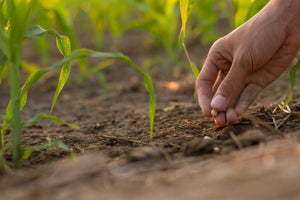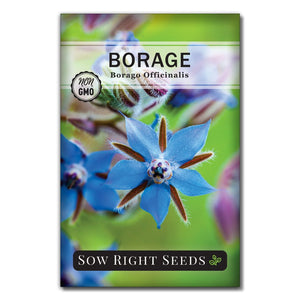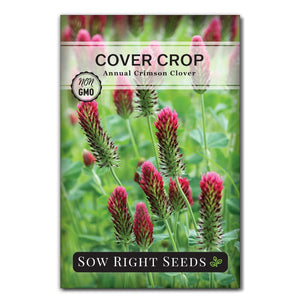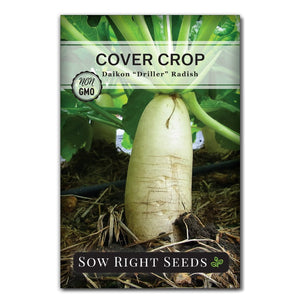How to Test Soil pH and Why It Matters to Your Garden Plants
Improving soilHave you heard that blueberries need acidic soil? Or have you been told to add lime to grow cabbage? If you're curious about soil pH and why it's important for gardening, here's what you need to know. Soil pH refers to the acidity or alkalinity of the soil, and it can significantly impact the growth and health of plants. Testing the pH of your soil will let you know what you’re starting with. From there, you can make informed decisions about which plants to grow and how to amend your soil for optimal plant health.

Why Does Soil pH Matter?
Why does it matter what the soil pH is? It's all about the nutrients! The health of your garden depends on the health of your soil. And when it comes to creating the best garden soil, pH is an important component.
The pH of soil is referring to how acidic or alkaline it is. This matters because most nutrients are soluble at a pH of 6.2 to 6.8, which means the soil nutrients are more available to plants in this range. Nitrogen, phosphorus, potassium, sulfur, calcium, and magnesium are all important plant nutrients that will be readily available for plants in soil with a neutral pH range.
When to test your soil pH
The best time to test your garden soil is in the fall. You can’t change your soil pH in a day, so testing weeks and months before planting will give you time to make adjustments. After you’ve added amendments to your soil, check it again in the spring to see the results of your amendments.
How to test your garden soil pH
You can test the pH of your soil in three ways: chemical test kits, electronic soil testers, and soil samples sent to a lab.
Chemical Tests
There are pH test strips that you can purchase from garden stores and online. To use test strips, you will take a soil sample and mix it with distilled water. After the mixture sits for a while, the test strip is dipped in and compared to the kit's color chart.
There are home DIY ways to use baking soda or vinegar to test the pH of your garden soil. These DIY tests won’t give you a number but will show you if you have extremely acidic or alkaline soil.
Electronic Soil Testers
An easy way to test your home soil is with digital and analog soil probes. These probes are pushed into the soil, where they will give a readout of the soil pH.
Lab Tested Soil Samples
If you want more in-depth information about your soil, you can send soil samples to your local extension service or a professional soil testing lab. These tests will tell you more than just your soil pH. They will also show the level of nutrients such as phosphorus, potassium, and calcium.
Changing Soil pH
After testing your garden soil, you may decide to change the pH. Remember that it takes time to change the pH, and you want to do it gradually so as not to move too far in the opposite direction. Test every few months after applying an amendment to track the changes.
A soil pH of 6 to 7 is the optimal range for growing most plants. A pH level of 4.6 is considered too acidic. If your soil is 5.5 or 7.5, your plants are usually okay. But you will want to make adjustments for anything outside of that range.
How to Raise the Soil pH - less acidic
A few plants thrive in acidic soil, and blueberries and azaleas are the most popular. But other plants will find it hard to grow in acidic soil. Adding limestone is the most common and inexpensive way to raise garden soil pH. There are two types of lime that you will want to consider. Dolomitic and calcitic. The difference between the two is the additional nutrients they provide. Dolomitic limestone will add manganese, and Calcitic lime will add calcium. You will want to know which of these nutrients your soil needs when choosing which lime to use.
Check the recommended application amount on the package when adding garden lime. The amount needed will change depending on the soil structure. The general guidelines are three pounds of lime for 100 square feet of sandy soil. Five pounds of lime for sandy to loamy soil. Seven pounds of lime for loam soil. And eight pounds of lime for 100 square feet of clay soil.
Wood ashes will also raise the soil pH and add potassium. However, wood ash works quickly and can easily make the soil too alkaline. Add ashes in the winter and only add one or two pounds per 100 square feet.
How to Lower the Soil pH - less alkaline
There are alkaline-loving plants like ferns and asparagus. But if your soil is too high, you will want to lower it for better plant growth. Lowering the soil pH is usually accomplished by adding ground elemental sulfur or gypsum. Again, this needs to be done carefully and slowly to avoid making the soil too acidic. Apply sulfur according to the package directions.
Soil pH Overview
-
Most plants thrive in pH levels between 6 and 7.
-
It takes time to change the pH. A change of .5 to 1 in a year is a good goal to shoot for.
-
Test your garden soil in the fall to make adjustments for spring planting.
-
Use lime to raise the pH.
Use sulfur to lower the pH.
Optimal Soil pH Levels for Vegetables, Flowers, and Herbs
Vegetables usually need a pH range of 6 to 7. This is a slightly acidic to neutral range where nutrients will be available to the plants. If your garden soil is in this range, you don’t need to make any changes. However, some plants are more sensitive to the pH level than others. With these vegetables, a little bit of movement to one side or the other can result in better growth.
Parsley is one herb that can tolerate a wide range and actually prefers a more acidic soil. It can thrive in soil as low as 5 on the pH scale.
Pansies, Snapdragons, and Zinnias can grow in soil with a pH as low as 5.5. Nasturtiums have the widest range pH range of 5.5 to 7.5. And Echinacea perfers alkaline soil.
Determining the pH level of your garden soil is crucial for ensuring optimal nutrient availability for your plants. Whether you choose to use test strips, a soil probe, or send samples to a lab for testing, knowing the pH of your soil will provide you with valuable information.
By understanding why the pH of your soil matters, you can make necessary adjustments to create the ideal pH for your garden and promote healthy plant growth.










Leave a comment